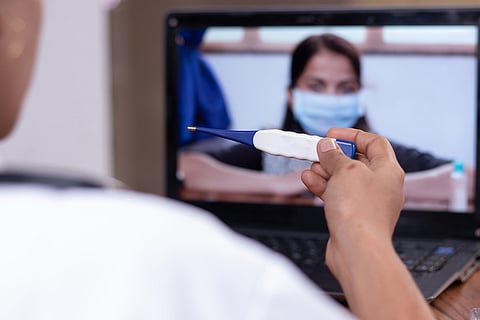

When we think of ‘doctor consultations’, the first thing that comes to our mind are hospitals. But the current pandemic and the subsequent lockdown has changed the way we look at healthcare. While the lockdown has limited our mobility and denied easy access to hospitals, we have witnessed an accelerated adoption of digital healthcare in the Indian healthcare ecosystem.
Swasth is an initiative promoted by a group of health and technology professionals. The mobile app-based service aims to leverage India’s technological prowess to deliver equal and affordable healthcare to all its citizens, cutting across geographical and income divides.
Swasth is a non-profit consortium which has brought together over 100 different private service providers under one roof. The Swasth app provides free telemedicine consultation.
However, the app goes beyond being just a telemedicine app as it provides a whole host of services ranging from booking a test, purchasing medicines online, searching for the closest hospital along with phone numbers, and giving updates on bed availability.
All COVID-19 consultations on the app are free while patients are required to pay for other services. For healthcare service providers, Swasth claims to present a new source of revenue and business for them. However, Swasth declined to comment on what the pricing is like for the paid services on its app.
The Swasth app can be downloaded for both Android and iOS platforms. Users need to create a user profile following which they have to go through a questionnaire to determine the presence and severity of COVID-19 symptoms, if any. Post this, doctor call-backs are arranged for prescribing medicines and tests. The consultation service is initially available in Hindi, English and Gujarati, with plans to expand it to 25 languages.
Abhinav Lal, key member of Tech and Product council, Swasth and Co-Founder & CTO at Practo says that the initial focus was on increasing immediate reach and creating a positive impact in the fight against COVID-19.
“Over the last few months, the platform has evolved into a Digital Healthcare Network from a tele-health platform for corona care. As a part of this metamorphosis, we recently broadened the services by launching our first comprehensive service for mental wellbeing. It includes a 24x7 crisis helpline, content for self-care, online therapy by medical specialists and wellness packages for a healthy living. We will continue to work on creating similar healthcare solutions for the country in the coming days,” he says.
In the process of building Swasth, in order to ensure quick development, multiple teams were created which worked parallelly towards a common goal. Each team had multiple volunteers based on their knowledge and capabilities, says Abhinav. “The Tech and Product council which I am a part of includes prominent names in the industry like Ajit Narayanan from mFine, Gaurav Agarwal from 1MG, and Shamik Sharma from cure.fit. The work is volunteer-driven, and each team member takes up work and responsibility based on their bandwidth and proficiency. Our core objective is to leverage our experience and domain knowledge to create a robust tech mechanism that can accommodate the health requirements of 1.3 billion Indians,” he says.
Abhinav adds that Swasth aims to connect 1.3 billion Indians digitally and instantly to the best healthcare, at their preferred time and convenience. “This framework will also enable doctors and entrepreneurs to launch a wide plethora of healthcare businesses that would benefit the end customer in a multitude of ways. Swasth volunteers are working relentlessly on the ground to educate the masses about the benefits of the platform as a result of which, we have witnessed a consistent increase in the number of people visiting the platform. So far, around 2,50,000 consultations have been done on the Swasth app, and the platform generates about 2,000 doctor-hours per day,” he says.
Abhinav says that Swasth has designed a Round Robin’ algorithm to allocate incoming calls from the patients among all providers fairly through video and telephone calls.
“When a new consultation request comes in, all providers are polled for their ability to service that request - an allocation is then made keeping in mind the language of the consultation, capacity of the provider networks and also demand serviced so far. Thus, all the doctors who are a part of Swasth see equal demand in line with their capacity irrespective of whether the inflow of queries is low or high,” says Abhinav.
Swasth has been built on the confidence that digital healthcare is set to grow exponentially. Abhinav believes the post-COVID Indian healthcare ecosystem will be radically different from the one before the outbreak of the pandemic. He says there is an evident behavioural change in the way individuals have started accessing healthcare in the country.
“People are already opting for telemedicine apps even for delivering monthly medicines, booking appointments, home-based sample collection of tests, etc. This trend, which is a necessity right now, will act as a catalyst to accelerate the adoption of telemedicine in the country. With the smartphone users in Indian poised to grow to 500 million by 2025, this transition will be smooth and swift,” he says.